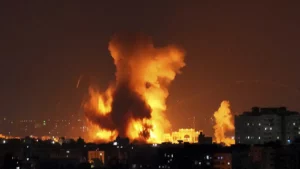(May 12, 1933 – June 1, 2010) was a Soviet and Russian poet and writer who had been referred to by Robert Lowell as “one of the greatest living poets in any language.
His first poems were published in 1958, and these immediately reflected his unique style. His lyrics are characterized by his tendency “to measure” the contemporary person by modern categories and images, by the eccentricity of metaphors, by the complex rhythmical system and sound effects.
Notable works: This list is incomplete: The Triangular Pear; First Frost; Antiworlds; Stained-glass Master; Violoncello Oakleaf; Videoms and Fortune Telling by the Book; Arrow in the Wall; I am Goya; A Shallow Paradise; Dogalypse; The Parabolic Ballad; The Antiworlds: Glance(Vzglyad); My Friend’s Light; Her Story; Russian-American Romance; Abuses and Awards; A Ballad (Thesis for a Doctor’s Degree); Who Are You?; Rubber Souls; Fate; Self-Portrait; The Song; Modern Nature;
Million alyh roz (with music by Raimonds Pauls); Story Under Full Sail; A Story of Love and Loss; Someone is Beating a Woman; Dogalypse. San Francisco Poetry Reading City Lights Books, The Pocket Poets series: Number 29 (in English).
Awards and nominations: In 1978 Voznesensky was awarded the USSR State Prize.He was an honorable member of ten academies, including the Russian academy of learning (1993), the American Academy of Arts and Letters, Parisian Académie Goncourt and others. On Tuesday, 23 December 2008, Russian President Dmitry Medvedev bestowed a state award upon Voznesensky at the Kremlin; Order of Merit for the Fatherland; 2nd class (May 5, 2008) – for outstanding achievements in the development of literature and many years of creative activity; 3rd class (January 15, 2004) – for outstanding contribution to the development of national literature; Order of the Red Banner of Labour (1983); USSR State Prize (1978) – a collection of “stained glass maker” (1976); Golden Badge of Honour “Public Recognition” (2003).
The Nose
The nose grows during the whole of one’s life
(from scientific sources)
Yesterday my doctor told me:
“Clever you may be, however
Your snout is frozen.”
So don’t go out in the cold,
Nose!
On me, on you, on Capuchin monks,
According to well-known medical laws
Relentless as clocks, without pause
Nose-trunks triumphantly grow.
During the night they grow
On every citizen, high or low,
on janitors, ministers, rich and poor,
Hooting endlessly like owls,
Chilly and out of kilter,
Brutally bashed by a boxer
Or foully crushed by a door,
And those of our feminine neighbors
Are foxily screwed like drills
Into many a keyhole.
Gogol, that mystical uneasy soul,
Intuitively sensed their role.
My good friend Buggins got drunk: in his dream
It seemed that, like a church spire
Breaking through washbowls and chandeliers,
Piercing and waking startled ceilings,
Impaling each floor like,
Receipts on a spike,
Higher and higher
rose
his nose.
“What could that mean?” he wondered next morning.
“A warning,” I said, “of doomsday: it looks
As if they were going to check your books.”
On the 30th poor Buggins was haled off to jail.
Why, O Prime Mover of Noses, why
Do our noses grow longer, our lives shorter,
why during the night should these fleshly lumps,
like vampires or suction pumps,
Drain us dry?
They report that Eskimos,
Kiss with their nose.
Among us this has not caught on.
Translated by W. H. Auden
Nostalgia for the present
I don’t know about the rest of you,
but I feel the cruelest
nostalgia -not for the past-
but nostalgia for the present.
A novice desires to approach the Lord
but is permitted to do so only by her Superior.
I beg to be joined, without intermediary,
to the present.
It’s as if I had done something wrong,
Not I even –but others.
I fall down in a field and feel
nostalgia for the living earth.
No one can ever tear you away,
and yet when I embrace you again
I feel overcome by terrible pain
as if you were being stolen from me.
When I hear the nasty tirades
of a friend who has taken a false step,
I don’t look for what he seems to be,
I grieve for what he really is.
A window opening on a garden
will not redeem loneliness.
I long not for art –I choke
on my craving for reality.
And when the Mafia laughs in my face
idiotically, I say:
“Idiots are all in the past. The present
calls for fuller understanding.”
Black water spurts from the faucet,
Brackish water, stale water,
rusty water flows from the faucet –I’ll wait
for the real water to come.
Whatever is past is past. So much the better.
But I bite at it as at a mystery,
nostalgia for the impending
present.
And I’ll never catch hold of it.
Translated by Vera Dunham and H. W. Tjalsma
Saga
You will awaken me at dawn
And barefoot lead me to the door;
you’ll not forget me when I’m gone,
you will not see me anymore.
Lord, I think, in shielding you
From the cold wind of the open door:
Ill’ not forget you when I’m gone,
I shall not see you anymore.
The admiralty, the Stock Exchange
I’ll not forget when I am gone,
I’ll not see Leningrad again,
Its water shivering at dawn.
From withered cherries as they turn,
Brown in the wind, let cold tears pour:
It’s bad luck always to return,
I shall not see you anymore.
And if what Hafiz says is true
and we return to earth once more,
well’s miss each other if it’s true;
I shall not see you anymore.
Our quarrels then will fade away,
to nothing when we both are gone,
And when one day our two lives clash
Against that void to which they’re drawn.
Two silly phrases rise to sway
On height of madness from earth’s floor
I’ll not forget you when I’m gone,
I shall not see you anymore.
Translated by William Jay Smith and Vera Dunham
Autumn in Sigulda
Hanging out of the train, I
Bid you all good-bye.
Good-bye, Summer:
My time is up.
Axes knock at the dacha
As they board it up:
Good-bye.
The woods have shed their leaves,
Empty and sad today
As an accordion case that grieves
When its music is taken away.
People (meaning us)
Are also empty,
As we leave behind
(We have no choice)
Walls, mothers, womankind:
So it has always been and will be.
Good-bye, Mother,
Standing at the window
Transparent as a cocoon: soon
You will know how tired you are.
Let us sit here a bit.
Friends and foes, adieu,
Good-bye.
The whistle has blown: it is time
For you to run out of me and I
Out of you.
Motherland, good-bye now.
I shall not whimper nor make a scene,
But be a star, a willow:
Thank you, Life, for having been.
In the shooting gallery,
Where the top score is ten,
I tried to reach a century:
Thank you for letting me make the mistake,
But a triple thank-you that into
My transparent shoulders
Genius drove
Like a red male fist that enters
A rubber glove.
Voznesensky may one day be graven
In cold stone but, meanwhile, may
I find haven
On your warm cheek as Andrei.
In the woods the leaves were already falling
When you ran into me, asked me something.
Your dog was with you: you tugged at his leash and called him,
He tugged the other way:
Thank you for that day.
I came alive: thank you for that September,
For explaining me to myself. The housekeeper, I remember,
Woke us at eight, and on weekends her phonograph sang
Some old underworld song
In a hoarse bass:
I give thanks for the time, the place.
But you are leaving, going,
As the train is going, leaving,
Going in another direction: we are ceasing to belong
to each other or this house. What is wrong?
Near to me, I say:
Yet Siberias away!
I know we shall live again as
Friends or girlfriends or blades of grass,
Instead of us this one or that one will come:
Nature abhors a vacuum.
The leaves are swept away without trace
But millions more will grow in their place:
Thank you, Nature, for the laws you gave me.
But a woman runs down the track
like a red autumn leaf at the train’s back.
Save me!
Translated by W. H. Auden
Phone booth
Someone is loose in Moscow who won’t stop
Ringing my phone.
Whoever-it-is- listens, then hangs up.
Dial tone.
What do you want? A bushel of rhymes or so?
An autograph? A bone?
Hello?
Dial tone.
Someone’s lucky number, for all I know,
Is the same, worse luck, as my own.
Hello!
Dial tone.
Or perhaps, it’s an angel calling collect
To invite me to God’s throne.
Damn, I’ve been disconnected.
Dial tone.
Or is it my old conscience, my power of choice
To which I’ve grown
A stranger, and which no longer knows my voice?
Dial tone.
Are you standing there in some subway station, stiff
And hatless in the cold,
With your finger stuck in the dial as if
In a ring of gold?
And is there, outside the booth, a desperate throng
Tapping its coins on the glass, chafing its hands,
Like a line of people who have been waiting long
To be measured for wedding bands?
I hear you breathe and blow into some remote
Mouthpiece, and as you exhale
The lapels of my coat
Flutter like pennants in a gale.
The planet’s communications are broken.
I’m tired of saying hello.
My questions might as well be unspoken.
Into the void my answers go.
Thrown together, together,
With you, with you unknown.
Hello. Hello. Hello there.
Dial tone. Dial tone. Dial tone.
Translated by Richard Wilbur




